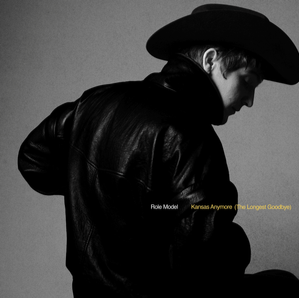ROLE MODEL’s take on heartbreak in his album Kansas Anymore (The Longest Goodbye).
Role Model’s (Tucker Pillsbury) is an American singer-songwriter known for his emotionally raw lyrics and mellow blend of indie pop and lo-fi sounds. Originally starting as a rapper, he shifted toward melodic, introspective music that resonates with Gen Z through themes like love, mental health, and self-discovery.
Role Model’s album offers a vast showing of the emotions that come with a breakup. It offers the ups and downs you face, and how many changes you go back and forth from daily.
The album opens with Writing’s On The Wall, is a jump into the denial you feel immediately after. It has various mentions of how things don’t fit, and how he refuses to accept this, or see through things. It has direct references to bad treatment he faced, yet decided to look past it, as he directly uses the title of the song to develop this in his lyric “Writing’s on the wall, I pretend I can’t read”, as well as his lyric “It’s never gonna work ’cause the puzzle won’t piece.”
The themes of people trying to help but having no effect are repetitive. This song fully helps you to feel and understand the time after breaking up, or after realizing a relationship is falling apart, and not believing it, especially after a long-term commitment.
The second song on the album, Look At That Woman, develops the feeling of longing for an ex-lover and the lingering feelings one may have. The chorus, repeating “look at that woman, breaking my heart,” highlights the artist’s fixation on his ex and how deeply her absence affects him. This song gives more insight into the post-breakup feelings and the lingering feelings you hold, and how the feelings build.
The album then continues with its regretful tones with its third song, Scumbag. It is a display of someone deeply in disgust with themselves, repeatedly referring to himself as a scumbag, train wreck, and a set back among other things. It also, among these aspects, has a more positive, reminiscent hook, speaking on how, through all of it, someone stood by him, loving the things he hated about himself. At its core, it’s a love song wrapped in self-doubt.
The album then flows into its fourth song, Oh, Gemini, which is a melancholic look into the feeling that comes when a relationship has, or will eventually, fall apart. The song reflects on the hardships that have broken apart the relationship, but regardless, the desperation comes in the feelings of needing to be remembered. He pleads to be looked back on often, “Please remember my name” is repeated various times, deepening that feeling of dependence on the relationship’s legacy. The song’s central theme weaves together emotions in a heartfelt search for meaning.
The fifth song, Frances, is undeniably a song about pure heartbreak and regret. Role Model uses Frances as a symbol of an almost perfect person he lost to his own shortcomings. The track starts with immediate claims of how she was amazing, and how in all of his bad and good moments, she was there. He was in complete awe of this girl and noticed everything about her, and repeatedly replayed the moments and obsesses over what he could have done differently. He thinks all the time about what could have been changed to make her stay, and how he is going to cope with this heartbreak. The song is brought together by his claims of why he still “can’t get it right.” It’s an homage to a time when things felt whole.
The album then repositions itself suddenly to a more upbeat song, almost opposite of the last track, Superglue. It’s a different style of love song, as it still admits the hardships that the relationship has undergone and where things have gone wrong, yet they are going to “make it through.” It is an overall promise that the relationship will last and they will stick by each other, even with all that is wrong in the seemingly toxic partnership.
The album then takes a brief pause from the past themes relating directly to breakups, and looks at a homesick set of emotions with the song The Dinner. This song is a display of feelings you feel when you are exposed to a superficial setting, especially when you were raised in a household that favored the opposite. The dinner he is at is representative of an entire society that he does not fit in with, and this leads to him eventually getting up and leaving, after repeated tries to fit in. The song is also a plea to his home, with mentions of Kansas and a desire to “Take me home.” In the end, the song is a quiet rebellion — a longing for authenticity in a world that feels anything but real.
Altering back to a breakup album, we have the eighth song, Deeply Still In Love. This song explores the emotional aftermath of a breakup, focusing on a self-agonizing point of view, along with being proud of the ex. It touches on the themes of everything being easier and happier now that the breakup has happened. The ex is now sober, happier, and he says, “It must be easier without me around.” He instead is in a state of constant torturous reminiscing, unable to forget and move on, suggested by the very title of this song. In a vulnerable confession wrapped in heartbreak, the song captures the lingering ache of love unreturned — a quiet struggle between letting go and holding on to what once was.
The pain of the last song slips into spiral in his ninth song Slut Era Interlude. It is a blatant mood change, able to be told solely from the title change Deeply Still In Love to Slut Era Interlude. This song portrays one of many careless methods you attempt to heal. It is a slightly blurry telling of what was done to recover and get past his ex. It shows the careless attitude you have when you are desperate to feel something. In the end, it still all ties back to the ex, showing how the attempt was unsuccessful.
The tenth song, So Far Gone, utilizes a duet with Lizzy McAlpine to emphasize each side of a relationship that has painfully fallen apart. Both partners blame each other, comparing each other to family members and revealing emotional wounds. Despite the grappling hurt, there is a focus on the hurt they together share, with the recurring chorus expressing a longing for honesty: “If you wanted me to go, you should’ve told me.” It’s a raw, emotional look at what’s left unsaid when love falls apart.
The album flows into chaos in its eleventh song, Slipfast. This song captures a sense of emotional disorder with a craving to escape from reality. The artist reflects on past versions of himself- reckless, impulsive, and self-destructive—with a confession that there is still part of him that searches for that chaos. With themes of addiction, regret, and avoidance, the repeated line “slip fast, get carried away” becomes a mantra for losing control as a form of temporary relief.
The album then shines on the ups and downs of a breakup, with the change from the previous song to the twelfth song Compromise. Through simple gestures and heartfelt emotion, he reaffirms their commitment and gently encourages their partner to believe in love again — a quiet promise that true love doesn’t demand you change or settle, but patiently stands by, hoping for your healing.
The non-deluxe album closes out with the thirteenth song, Something, Somehow, Someday. The artist ends the original album on a hopeful note that thrives on the opposites between two people. The song has a repetitive style that consistently points out differences between two people, on everything from clothes to family to their emotions, yet they are meant to be. It is a tribute to a relationship that goes against all odds but survives through it all.
As the album transitions to its four deluxe songs, it also takes on a newly found reminiscent and nostalgic set of emotions. It contributes to the new themes of the deluxe by suggesting new emotions because more time has passed. The first deluxe song, Old Recliners, jumps into themes of remembrance, consistently talking about past events. The song goes back and forth, showing the depth of the present when things were happy in a relationship, pushing the narrative that they are both barely getting by now, and they both miss the happiness from the relationship. “Old Recliners” captures the quiet ache of looking back on a relationship that once brought joy, contrasting it with the emptiness of the present — a gentle, melancholic reflection on love that still lingers in the corners of everyday life.
The deluxe then changes directions completely, seemingly telling a new story with Sally, When The Wine Runs Out. It conveys the feeling of intoxication with a new woman, mixed with a fear of being left behind, tying back to the rest of the album. He feels a connection to this woman and her magnetic energy, yet is fearful because she seems familiarly unpredictable. Through vivid scenes and emotional vulnerability, the song captures the thrill of spontaneous romance mixed with the anxiety of impermanence—a dance between desire and the fear of disappointment.
Then, without much dwelling on positive feelings, the deluxe takes a violent turn back to the past with Some Protector. This song is a perfect portrayal of trying over and over again to get over a relationship, but never being able to reach the point of recovery. It’s a raw confession that even with time and distance, some connections remain carved into the heart, not as memories, but as responsibilities that never fade.
The deluxe album then ultimately closes out with its fitting final song, The Longest Goodbye. It serves not only as an ending to the album but as a bittersweet final statement on a relationship that has run its course. The narrator moves through different emotions and stages he has faced, such as hurt, confusion, denial, hopefulness, and finally acceptance, recognizing flaws and the wrongs of the relationship and each person. Through vivid storytelling and emotional honesty, the song captures the quiet heartbreak of realizing love has faded on both sides, even if certainty about moving on is still out of reach.
At first glance, this album may seem like just a breakup album, but it’s so much more than that. It’s a layered, emotional roadmap of love’s unraveling and everything that comes after. With each track, Role Model expresses a new form of vulnerability, showing his hurt in each. The way that each song flows into the next is a great representation of heartbreak, even signifying the unexpected turns when a song like Frances slips into Superglue in a seamless storytelling of the ups and downs of heartbreak. Whether it’s denial, regret, self-doubt, nostalgia, or the desperate grip of unresolved love, this album gives every emotion its moment. The addition of the deluxe tracks doesn’t just expand the tale—it deepens it, offering a more complete picture of how heartbreak lives with us. By the time the final song fades, Kansas Anymore, The Longest Goodbye doesn’t just say goodbye to a person, but to a version of yourself—one that had to be let go to move forward.



